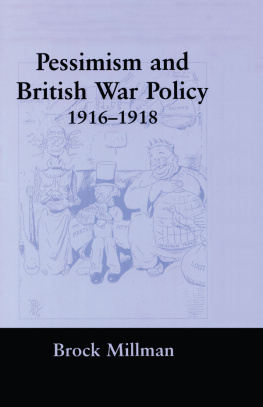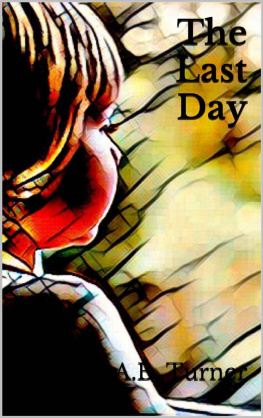
MANAGING DOMESTIC DISSENT IN FIRST WORLD WAR BRITAIN
CASS SERIES: BRITISH POLITICS AND SOCIETY
ISSN 1467-1441
Series Editor: Peter Catterall
Reflecting a belief that social and political structures cannot be understood either in isolation from each other or from the historical processes which form them, this series will examine the forces which have shaped contemporary British politics and society. Social change impacts not just upon voting behaviour and party identity, but also the formulation of policy. But how do social changes and political developments interact? Which shapes which? Books in the series will aim to make a contribution both to existing fields, such as politics, sociology or media studies, as well as opening out new and hitherto neglected fields such as management history.
The Making of Channel 4, Peter Catterall (editor)
Managing Domestic Dissent in First World War Britain, Brock Millman
Pessimism and British War Policy, 19171918, Brock Millman
Amateurs and Professionals in Postwar British Sport, Adrian Smith and Dilwyn Porter (editors)
| Institute of Contemporary British History |
The Institute of Contemporary British History was founded in September 1986 to stimulate research into and analysis of recent history, through conferences, publications, and archives and other research tools, which will be of value to decision-makers, students and the wider public. It aims to be both a centre of excellence for research into recent British history and a source for advice and information for researchers and those with a general interest in the field.
Managing Domestic Dissent in First World War Britain
Brock Millman
Royal Military College, Kingston, Ontario
First published 2000 by
FRANK CASS PUBLISHERS
Published 2013 by Routledge
2 Park Square, Milton Park, Abingdon, Oxon OX14 4RN
711 Third Avenue, New York, NY, 10017, USA
Routledge is an imprint of the Taylor & Francis Group, an informa business
Copyright 2000 Brock Millman
British Library Cataloguing in Publication Data
Millman, Brock
Managing domestic dissent in First World War Britain.
(Cass series. British politics and society)
1. World War, 19141918 Protest movements Great Britain 2. Great Britain Politics and government 19101936
I. Title
940.3'16
Library of Congress Cataloging-in-Publication Data
Millman, Brock, 1963
Managing domestic dissent in First World War Britain / Brock Millman.
p. cm. (Cass seriesBritish politics and society)
Includes bibliographical references (p. ) and index.
1. Great BritainPolitics and government19101936. 2. World War, 19141918Protest movementsGreat Britain. 3. Peace movementsGreat BritainHistory20th century. 4. DissentersGreat BritainHistory20th century. 5. World War, 19141918Great Britain. I. Title. II. Series.
DA577.M55 2000
940.3'41dc21
00-025434
ISBN 13: 978-0-714-65054-8 (hbk)
ISBN 13: 978-0-714-68105-4 (pbk)
All rights reserved. No part of this publication may be reproduced, stored in or introduced into a retrieval system or transmitted in any form or by any means, electronic, mechanical, photocopying, recording or otherwise, without the prior written permission of the publisher of this book.
Typeset by Vitaset, Paddock Wood, Kent
Contents
Chronology of Events
The deluge of the First World War swept away not only millions of lives, but thrones and empires. As the conflict settled into a war of attrition without obvious end, states found themselves forced into an ever-more intense management of both the war and domestic fronts. Societies were tested to destruction by the demands placed by the war upon their economies, manpower reserves and social fabric. By the wars end all the major combatants were experiencing dissent either in the armed forces or domestically, or both.
Brock Millmans excellent and innovative work examines how the state coped with the rising tide of dissent unleashed by the supreme social stresses of the First World War through a meticulous case study of how one major combatant, Britain, dealt with these problems. Placing dissent centre-stage as a problem to be managed in the conduct of war gives a very different perspective from that of traditional military history. Not only that, it also helps to illuminate some aspects of war policy that can otherwise seem obscure, such as the retention of troops in Britain for which Lloyd George was to be censured in the Maurice debate in 1918. The perspective Millman provides makes it clear that there were two wars going on, one in the trenches and one for retention of control at home to ensure that the other could still be supplied. In the process, he skilfully interweaves these two conflicts, making clear the extent to which they impacted upon each other.
This was more than a matter of the passage of the Defence of the Realm Act (DORA) 1914, and its various manifestations. Millman makes it clear that dealing with dissent involved far more than DORA, or the elaboration of the necessary machinery in the Home Office or other departments of state. By clarifying the often informal structures, not dissimilar to the Crown and Anchor Clubs and other such bodies of the Napoleonic era, through which a patriotic alliance was forged, he provides a much more textured account of social conflict and its management during the First World War. At the same time, he illuminates the way in which the war and its consequences gradually provided the occasion for an alignment between mainly middle-class opponents of the conflict and working-class opposition to the degree of coercion it seemed to entail, into a broad-based, cross-class dissenting movement
The significance of this account, accordingly, lies not only in its contribution to military history. Nor is it confined to the light it undoubtedly sheds upon the way in which Whitehall and Westminster sought to manage social conflict during the First World War. In laying bare the changing nature and articulation of this social conflict it also helps to demonstrate that propaganda, whether patriotic or dissenting, is not just a matter of public meetings, films or newspapers addressed at an undifferentiated audience, but something that had to work with and helped to structure patriotic and dissenting alliances. Furthermore, in the process Millman explicates that realignment at the level of low politics wrought by the war, a realignment that was to consign Liberal England to the history books and forge an electoral alliance that was to ensure the Conservative dominance of the inter-war years.
Peter Catterall
Series Editor
AEU | Amalgamated Engineering Union |
AG | Adjutant General |
AJAG | Assistant Judge Advocate General |
ASE | Amalgamated Society of Engineers |
BL | |













